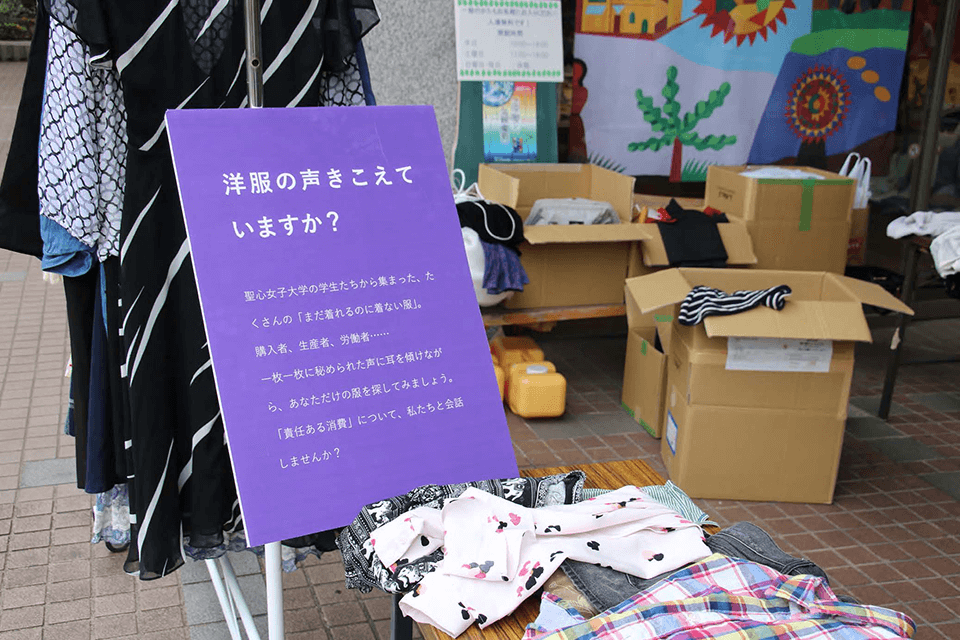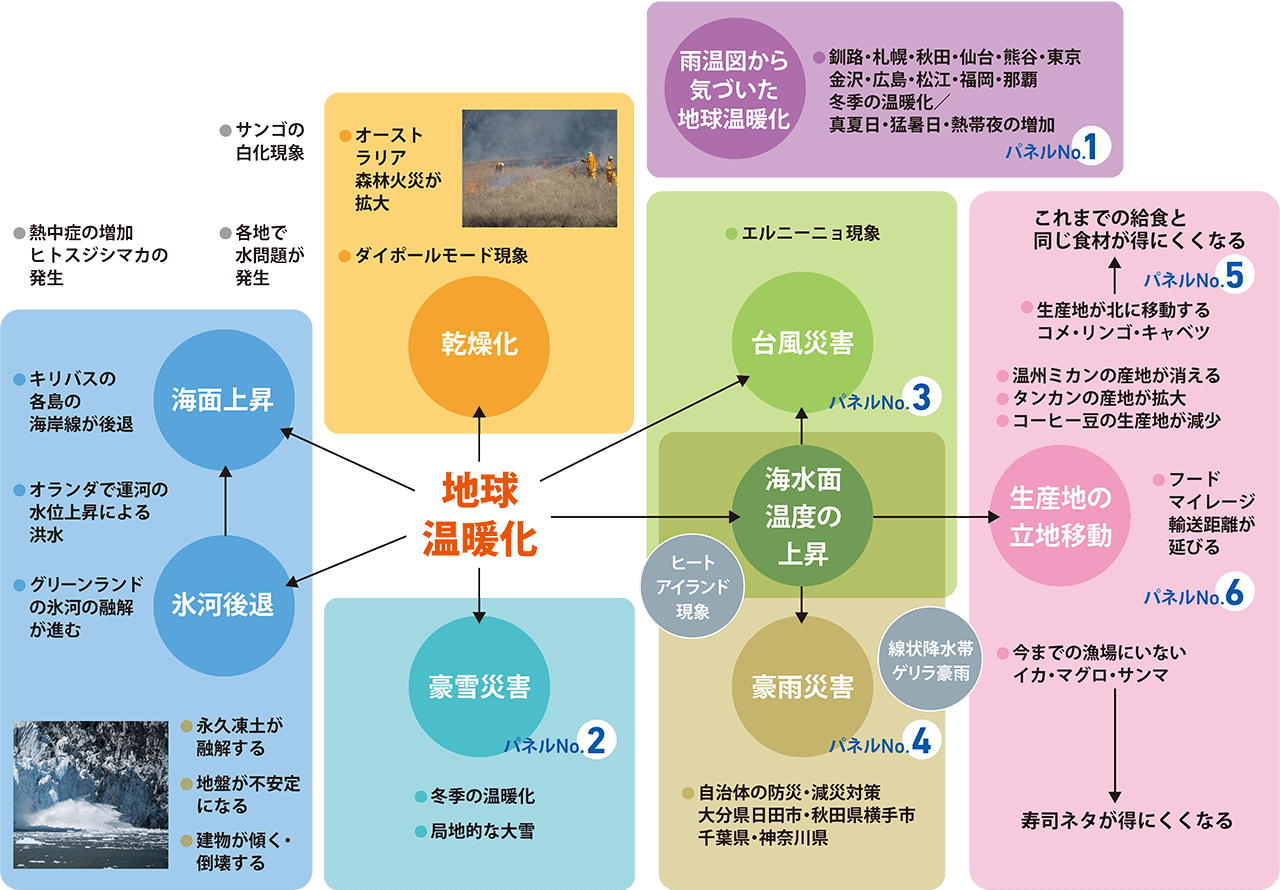気候変動から考える「私と私たち」
聖心の学生が気づいた気候変動
気候非常事態宣言(CED)の表明
「気候非常事態宣言(CED)」を表明しました。
この宣言は、2020年5月現在、世界30か国、約1,500の自治体と議会や大学などが、環境問題に関する意志を表明したものです。
本学の宣言には、国連等が標榜する普遍的な理念への支持をはじめ、食やゴミなどのキャンパス・ライフにおけるアクションも盛り込みました。ポスト・パンデミック(アフター・コロナ)時代においてこれまで以上に重要性を増す持続可能な社会を目指して、皆様とともに課題解決に向けて共に歩んでいければと願っております。
聖心女子大学
「気候非常事態宣言」
将来世代のために気候変動に適応し、
その影響を緩和することを目的に、
教職員は次の責任ある応答をしていきます。
- 若者たちが持続可能な未来に向けた変化の創り手・担い手となるように、SDGs関連の活動の支援に努めていきます。
- 国連等が提唱するACE(Action for Climate Empowerment)を推進します。
- 「気候変動に関する倫理原則」(UNESCO, 2017)に則り、「最も脆弱な人々を含むすべての関係者の有意義な参加が気候変動とその悪影響に対処するための効果的な意思決定に不可欠である」ことを認識し、気候正義の問題に取り組んでいきます。
- 全学的に気候変動(SDG13)はじめ、SDGsを意識した授業や課外学習を設計します。
- 学生の意見を積極的に取り入れ、教職員も学生も協働しながら気候変動対策に取り組んでいきます。
- 教室内での教えが実際にキャンパスで実践されるようにエネルギーや食、水、紙、ごみの分野での改善に全学的に努めていきます。
- 学生及び市民が持続可能な未来に向けて価値観・行動・ライフスタイルを変容させていくように学習機会の提供に継続的に努めていきます。
- 教育・研究活動を通じて、気候変動に関する知識・技能を提供し、気候正義について深く考える機会を積極的に設けます。
- ESG(環境・社会・ガバナンス)に配慮した大学運営を推進していきます。
2020年5月20日
聖心女子大学
学長 髙祖 敏明
背景と経過説明
2015年9月、国連持続可能な開発サミットで「我々の世界を変革する:持続可能な開発のための2030アジェンダ」が採択されました。そこでは、2030年までに持続可能な社会を実現するために全世界で共通の17の目標からなるSDGs(持続可能な開発目標)が掲げられており、気候変動はその13番目のゴールとして具体的な行動が求められるようになりました。
同年12月に開催された第21回国連気候変動枠組条約締約国会議(COP21)においては2020年以降の温室効果ガス排出削減等のための新たな国際枠組みとしてパリ協定が採択されました。この協定では産業革命以降の気温上昇を1.5度に抑える努力目標が掲げられており、2050 年までに温室効果ガスの排出を実質ゼロにする必要があります。
こうした世界の共通目標が掲げられた背景には、近年とくに深刻化する自然災害、つまり猛暑、干ばつ、大型台風、集中豪雨、洪水、海面上昇、大規模な森林火災が挙げられ、人間による活動に起因する自然現象が多くの被害をもたらしていることが科学的に証明されています。
このような「気候危機」とも呼ばれる時代の趨勢の中、若者たちが世界中で立ち上がるようになりました。2019年9月、ニューヨークの国連本部で開催された「国連気候行動サミット2019」に合わせて行われた「気候ストライキ」や「気候マーチ」に参加した若者は160ヵ国、400万人に上ると言われ、自分たちの未来を奪うかもしれない開発のあり方に対する問い直しを大人世代に求めています。
次世代の声に応答する形で気候変動の時代における教育の役割も見直されるようになりました。従来のように温暖化や気候変動に関する知識を授けるのみならず、アクションを起こす若者を支援していくことや若者とともに問題解決に向けて取り組んでいくことがより重視されつつあります。国際的には「気候変動対策をエンパワーするアクション」(ACE: Action for Climate Empowerment)が標榜され、各国で努力が積み重ねられています。聖心女子大学でもこのような国際的な意思に賛同し、上記の諸課題に取り組んでまいります。
Climate Emergency Declaration
The University of the Sacred Heart, Tokyo
- Support activities concerning Sustainable Development Goals (SDGs) so that young people may become creators of and agents for change towards a sustainable future;
- Promote Action for Climate Empowerment (ACE) as advocated by the United Nations and others;
- Work on issues of climate justice based on the Declaration of Ethical Principles in Relation to Climate Change (2017) adopted by UNESCO, recognizing “that meaningful participation of all stakeholders, including the most vulnerable, is essential to effective decision-making to address climate change and its adverse effects”;
- Design courses as well as extra-curricular learning activities on SDGs, with special focus on No. 13 of the Goals;
- Take measures on climate change in collaboration with students, fully taking into consideration their opinions;
- Put teachings from the classroom into practice by engaging in a whole institutional commitment to sustainable resources across campus regarding energy, food, water, paper and waste;
- Provide seamless learning opportunities for students and citizens to support a change in their values, behavior and lifestyles towards a sustainable future;
- Impart knowledge and provide skills concerning action on climate change, and also actively offer opportunities to think deeply about climate justice through educational and research activities; and
- Proceed with institutional management, actively taking environmental, social and governance (ESG) issues into consideration.
May 20, 2020
President
Toshiaki Koso
Background and Rationale
In September 2015, the United Nations General Assembly unanimously adopted a resolution called Transforming Our World: the 2030 Agenda for Sustainable Development. The document lays out 17 Sustainable Development Goals (SDGs); Goal No. 13 concerns climate change and calls the whole world to urgent action.
In December of the same year, the 21st Conference of the Parties to the United Nations Convention on Climate Change (COP21) was held, and the Paris Agreement, a new international framework aiming to reduce the emission of gases that contribute to global warming, was adopted. This Agreement sets an achievement goal, pursuing efforts to limit the temperature increase to 1.5°C above pre-industrial levels. In order to achieve this, we need to decrease carbon dioxide emissions substantially to zero.
The circumstances that led to setting these international common goals are the rise in serious natural disasters, such as extreme heat, drought, super typhoons, concentrated heavy rains, flooding, sea-level rise and large-scale forest fires. It is scientifically proven that human influence has made these disasters more severe.
In the midst of today’s climate crisis, younger generations are standing up to take action. In September 2019, more than four million youths from 160 nations participated in climate strikes or marches, simultaneously with the UN Climate Action Summit 2019 held at the United Nations Headquarters in New York. They are urging older generations to change the current development model now to ensure the future of today’s youth.
In response to the voices of youth, the role of education must also be reviewed. It is now even more important to support and address the issues young students stand for, rather than simply providing them with knowledge on global warming and climate change. International Action for Climate Empowerment (ACE) has been stipulated and efforts have grown worldwide. The University of the Sacred Heart, Tokyo, has agreed to join this international effort and is committed to addressing the above-mentioned issues.


アンケート
アンケートへのご協力をお願いいたします。

指導教員からのメッセージ
2019 年度の「教育課程論」は、総合的な学習の時間を学生が自ら体験する中で、教育課程についても考える授業をしました。授業を始めた時には「気候変動ってなに?」という状態でしたが、調べているうちに、学生は身近に気候変動の兆しを見つけました。
学生がふりかえりの中で次のように書いています。
「まず、私たちが総合学習を体験しつつ授業の組み立て方を学びました。気候変動の概要を学び、水、食糧、自然災害、学校のグループにわかれ、調べる中で資料のまとめ方、要点のしぼり方を学びました。データを整理すると、何にでもつながりがあり、それらをみんなで共有することが大切です。」
指導教員 生田清人(いくたきよと)